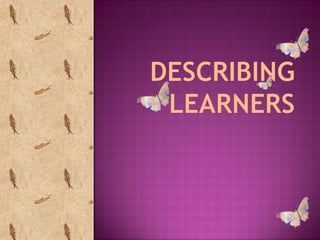
Describing learners 21 oct 2011
- 2. Learner Age differences Language levels
- 3. Young children Adolescents Age Adult learners
- 4. Young children, especially those up to the ages of nine or ten, learn differently from older children, adolescents and adults in the following ways: _ They respond to meaning even if they do not understand individual words. _ They often learn indirectly rather than directly – that is, they take in information from all sides, learning from everything around them rather than only focusing on the precise topic they are being taught. _Their understanding comes not just from explanation, but also from what they see and hear and, crucially, have a chance to touch and interact with. _They find abstract concepts such as grammar rules difficult to grasp.
- 5. -They generally display an enthusiasm for learning and a curiosity about the world around them. -They have a need for individual attention and approval from the teacher. -They are keen to talk about themselves and respond well to learning that uses themselves and their own lives as main topics in the classroom. -They have a limited attention span; unless activities are extremely engaging, they can get easily bored, losing interest after ten minutes or so.
- 6. Adult language learners are notable for a number of special characteristics: -They can engage with abstract thoughts. This suggests that we do not have to rely exclusively on activities such as games and songs – though these may be appropriate for some students. -They have a whole range of life experiences to draw on. -They have expectations about the learning process, and they already have their own set patterns of learning. -Adults tend, on the whole, to be more disciplined than other age groups and crucially, they are often prepared to struggle on despite boredom. -They come into classrooms with a rich range of experiences which allow teachers to use a wide range of activities with them. -Unlike young children and teenagers, they often have a clear understanding of why they are learning and what they want to get out of it. As we shall see in section D below, motivation is a critical factor in successful learning, and knowing what you want to achieve is an important part of this. Many adults are able to sustain a level of motivation (see D2) by holding on to a distant goal in a way that teenagers find more difficult.
- 7. However, adults are never entirely problem-free learners, and they have a number of characteristics which can sometimes make learning and teaching problematic. -They can be critical of teaching methods. Their previous learning experiences may have predisposed them to one particular methodological style which makes them uncomfortable with unfamiliar teaching patterns. Conversely, they may be hostile to certain teaching and learning activities which replicate the teaching they received earlier in their educational careers. -They may have experienced failure or criticism at school which makes them anxious and under- confident about learning a language. -Many older adults worry that their intellectual powers may be diminishing with age. They are concerned to keep their creative powers alive, to maintain a ‘sense of generativity’ (Williams and burden 1997:32). However, as Alan Rogers points out, this generativity is directly related to how much learning has been going on in adult life before they come to a new learning experience(1996:54).
- 8. Learner differences Aptitude and Good learner Learners styles intelligence characteristics and strategies
- 9. Convergers : these are students who are by nature solitary, prefer to avoid groups, and who are independent and confident in their own abilities. Most importantly, they are analytic and can impose their own structures on learning. They tend to be cool and pragmatic. Conformists: these are students who prefer to emphasize learning ‘about language’ over learning to use it. They tend to be dependent on those in authority and are perfectly happy to work in non-communicative classrooms, doing what they are told. A classroom of conformists is one which prefers to see well-organized teachers.
- 10. Concrete learners: though they are like conformists, they also enjoy the social interest in language use and language as communication rather than language as a system. They enjoy games and group work in class. Communicative learners: these are language use oriented. They are comfortable out of class and show a degree of confidence and a willingness to take risks which their colleagues may lack. They are much more interested in social interaction with other speakers of the language than they are with analysis of how the language works. They are perfectly happy to operate without the guidance of a teacher.
- 11. Neuro – linguistic programming MItheory: MI stands for multiple Intelligences, a concept introduced by the Harvard Psychologist Howard Gardner. he listed : intelligences Musical/rhythmical, Verbal/linguistic , visual/spatial, bodily/kinaesthetic, logical/ mathematical, intrapersonal/interpersonal
- 12. advanced Language levels Upper intermediate mid intermediate Lower intermediate/pre-intermediate elementary Real beginner false beginner